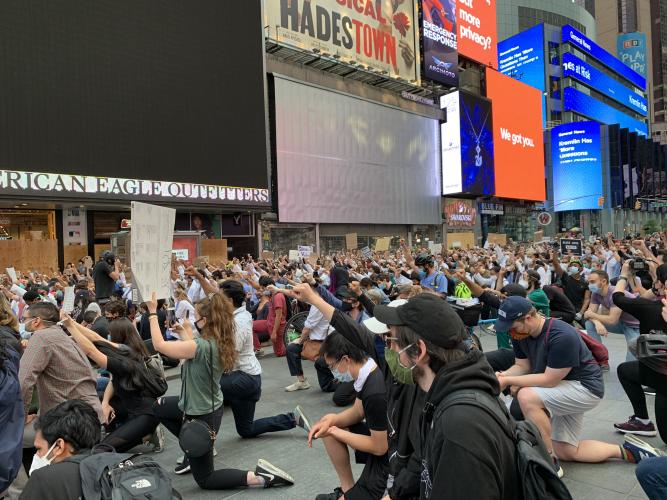
Race, Media & SAG-AFTRA
Since its founding, SAG-AFTRA has championed inclusion and held fast to the belief that our entertainment and our newsrooms should reflect the world in which we live. SAG-AFTRA continues to step up in this important role. That’s why, with racial inequities in the national spotlight, SAG-AFTRA has an important role to play in the conversation.
Sparked by the murders of George Floyd and Breonna Taylor, unrest broke out nationwide as protesters demanded police accountability and an end to the indiscriminate killing of African Americans. On the scene and in the newsroom, SAG-AFTRA journalists have been confronted with the realities of a system that does not treat all people equally.
America’s racial strife has also helped to underscore the way the media cover — or often fail to cover — minority communities. The situation prompted SAG-AFTRA’s National Broadcast Steering Committee to take the unusual step of issuing a public statement calling for more diversity in newsrooms. It’s crucial for news organizations to represent the communities they cover, from decisions on what topics are worth reporters’ time to the way stories are written.
Broadcaster and Chicago 1st Vice President Craig Dellimore said, “While we can say we want everything to be objective, it is important to realize that it’s objective from [one] perspective.
“If you grow up an upper-middle class white person in a big city versus growing up as a less-privileged Latinx person from the suburb, you’re going to see things differently. It doesn’t mean one is right and one is wrong, it simply means that you may recognize something as important to people that another person might not. Having that mix in a newsroom, having that discussion in a newsroom, I think makes what we do more relevant to the people who are consuming our work.”
Journalists have had to cope with some challenges unique to their profession. It can be a hostile environment in which to do their jobs, as they have been targeted by people across the political spectrum, with accusations that they are everything from “enemies of the people” to tools of the corporate media. In addition, numerous incidents have been reported of law enforcement targeting reporters during the protests.
According to pressfreedomtracker.us, which gathers data from major professional journalist organizations, as of July, more than 155 journalists were attacked in the United States, and 51 were arrested. U.S. Press Freedom Tracker also tracked more than 600 aggressions against the press during Black Lives Matter protests.
SAG-AFTRA President Gabrielle Carteris and National Executive Director David White issued a statement calling on police unions to reform their culture and confront racism:
“We reject and denounce police brutality and the corrupt systems that for decades supported a culture of racism, injustice and brutality. We stand in solidarity with all who have experienced injustice and violence at the hands of law enforcement. Police organizations must change.”
The Black Lives Matter movement has also renewed public attention to systemic inequities, from gross disparities in the criminal justice system to the disproportionate way the pandemic has affected Black and brown communities. At the end of June, the CDC reported that the rate of hospitalization for COVID-19 among non-Hispanic Black people was five times that of non-Hispanic white people.
Adding to this is a significant income gap and the lack of opportunity for African Americans in many fields. The disparity in the entertainment industry has long been a featured topic at SAG-AFTRA panels and events, and the union has continued the conversation with a series of livestream events featuring high-profile members such as Sterling K. Brown, National Board members Yvette Nicole Brown and Michelle Hurd, and others, moderated by National Board member Jason George. Also, two episodes of the SAG-AFTRA podcast were dedicated to examining the Black Lives Matter movement.
People with disabilities have also faced injustice. According to a 2016 Ruderman Family Foundation study, people with disabilities make up a third to half of all people killed by law enforcement officers.
SAG-AFTRA members are speaking out. Viola Davis has tweeted lists of Black-owned businesses to patronize and highlights injustice throughout her social media posts. Beyoncé has partnered with the NAACP to help fund Black-owned businesses and, in mid-June, penned an open letter calling on Kentucky’s attorney general to bring charges against the police officers who killed Breonna Taylor.
And Michael B. Jordan, one of many high-profile members who have attended protests, has teamed up with Color of Change, a racial justice organization, to launch #ChangeHollywood. The initiative aims to change models of storytelling by investing in Black talent and anti-racist content.
Journalist members have a role to play, too, Dellimore said.
“Have those sometimes-difficult conversations with your colleagues. If you’re in a newsroom that doesn’t have any diversity in it, maybe you want to talk to your colleagues and/or your bosses about why,” he said. “Something that to me is even more important is to make sure that … you reach out into your communities and make sure that [underrepresented] people are represented on the air. Do you only talk to African American or Latino experts if the subject is poverty or crime? You know, there are Black economists out there. There are Latina health experts.”
No matter whether performers or broadcasters, SAG-AFTRA members stand together in the continuing fight for equality and justice. As union members, we understand the meaning of solidarity and we will continue to stand together to achieve those worthy goals.
Top photo: A Hollywood Boulevard mural. Photo: IMAX
It is a core value of SAG-AFTRA that our strength is in our diversity. We are committed to the broadest employment and involvement of our members, regardless of race, national origin, ancestry, color, creed, religion, sex, marital status, sexual orientation, political affiliation, veteran status, gender identity or expression, age or disability.”
News
- Tags:
- SAG-AFTRA Magazine





